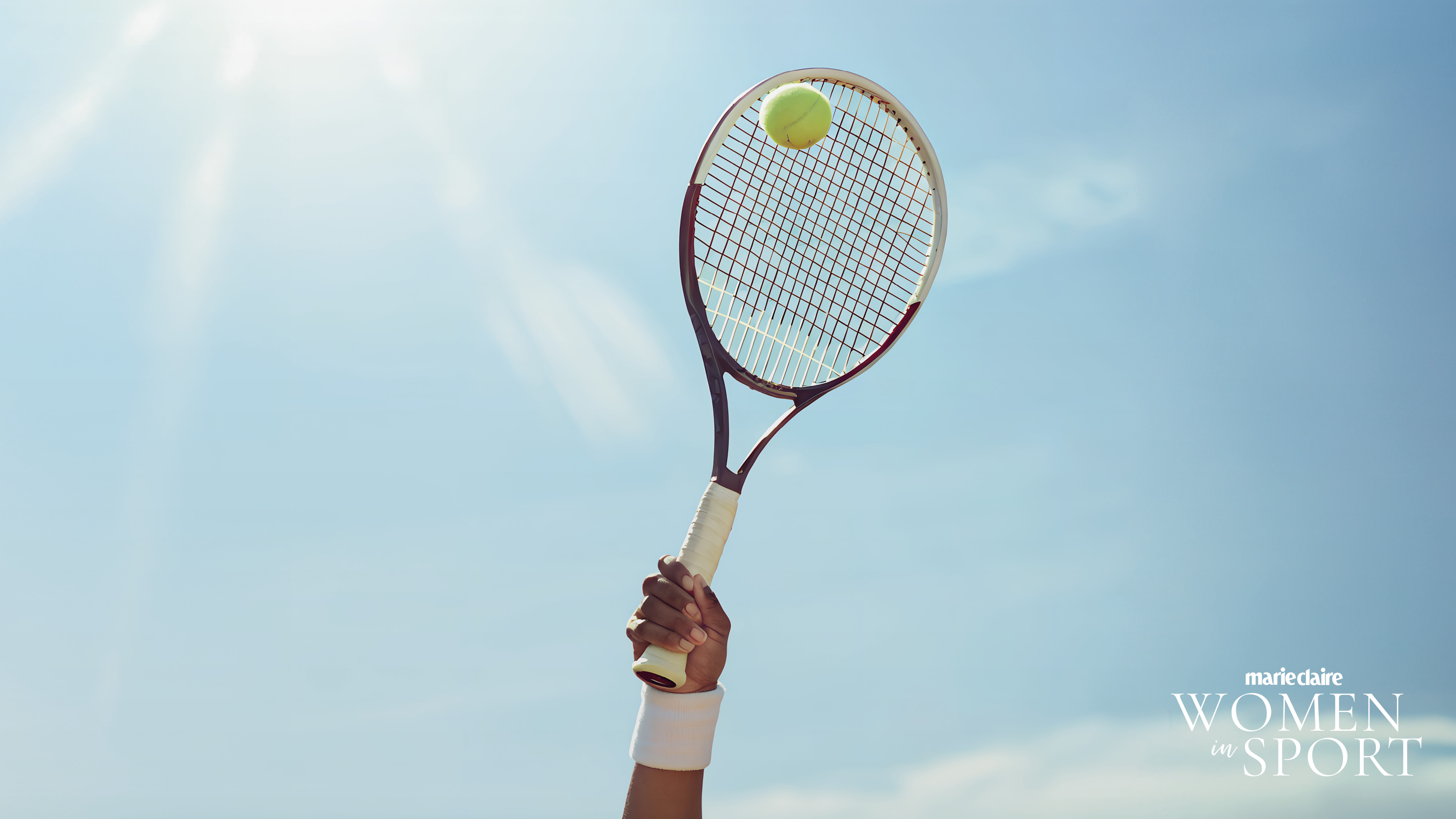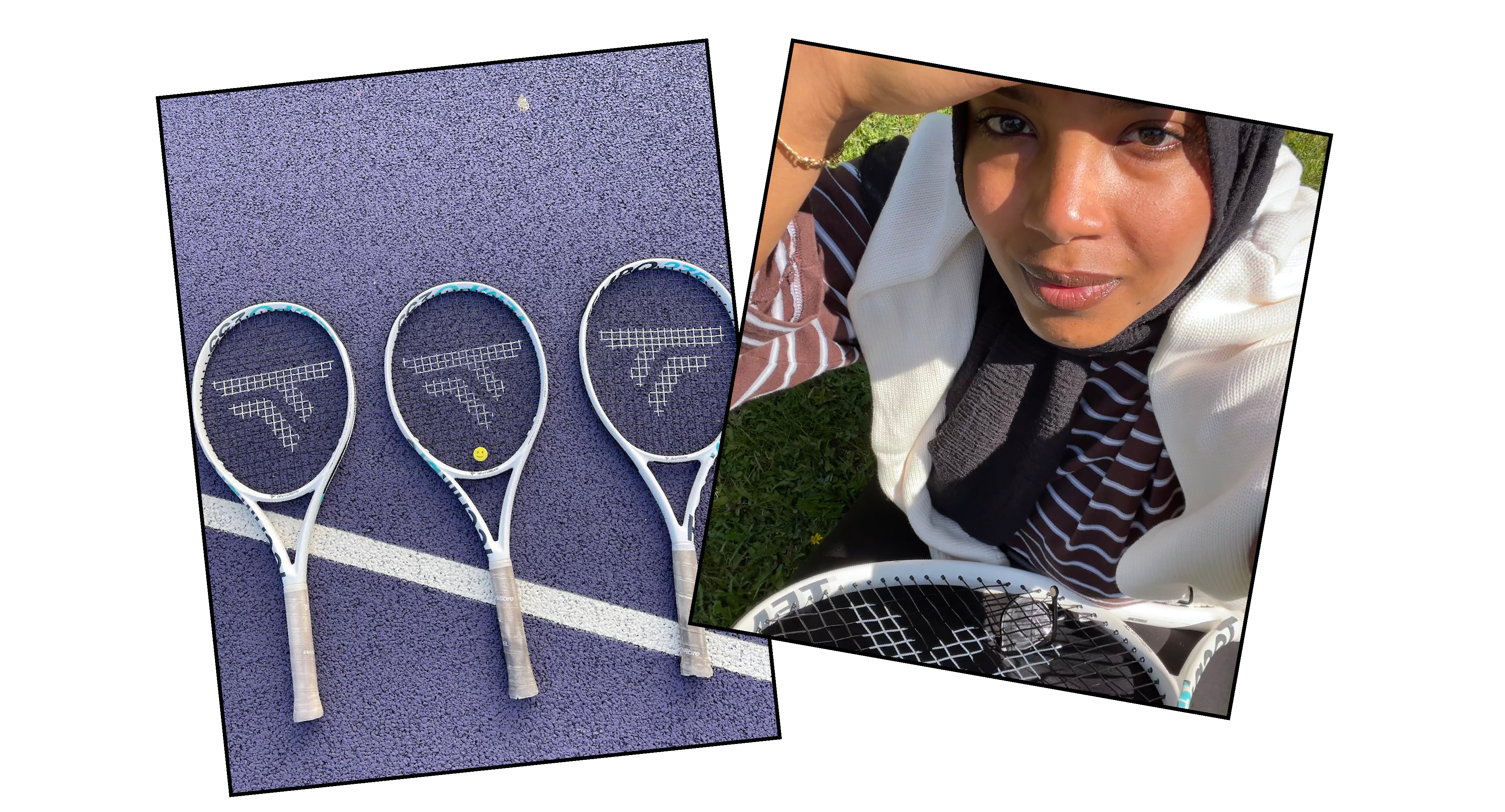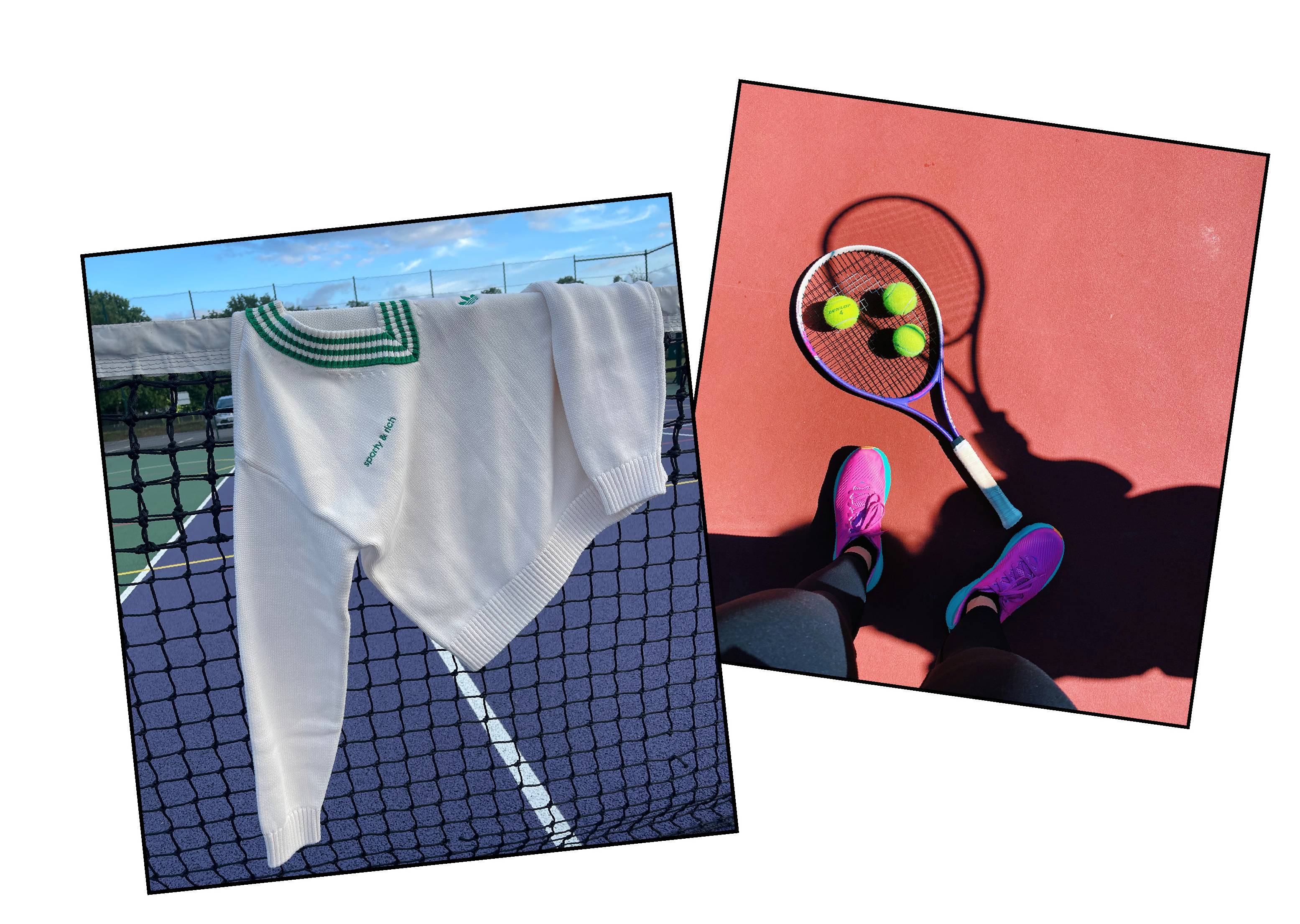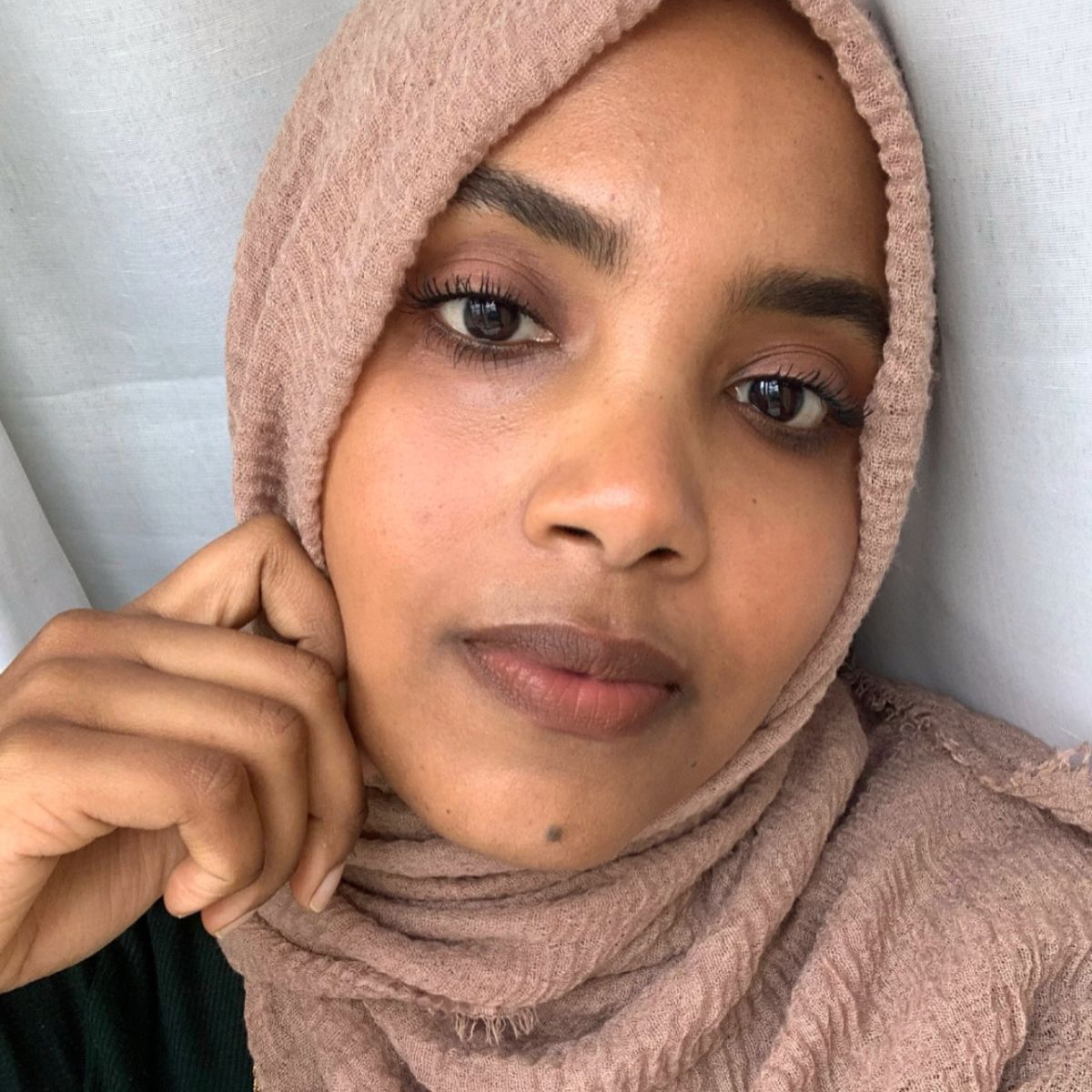I'm A Black Woman Who Felt Sport Wasn't For Me - But Tennis Clubs Created Space In An Often Elitist World
I found a space that made me feel included, welcomed, and like movement was for me.


I can count on one hand the number of sports groups I’ve taken part in in my lifetime. Most of them were part of our mandatory school P.E lessons, and you can bet that I tried all the usual tricks to get out of them.
For years, I’ve avoided group physical activities, especially the kind that involved coordination, competitiveness, and any kind of balls. It just wasn’t for me - I felt out of place and unwelcome.
Tennis, in particular, always daunted me. The sport has a reputation as a white, middle-class sport, with posh clubhouses, eye-wateringly expensive memberships and an unspoken rule that you ought to have started playing at the age of four. As someone who definitely did not have a coach pre-primary, the image deterred me from considering tennis as an option.
But last year, my cousin spontaneously signed us up for a game of tennis. I was so nervous that I doubted if I’d even make it to the court. My mind was racing - there would be other, more adept players there, and I’d have to coordinate my swings enough to actually hit the ball.
But I’d made a deal: I’d give it one try. If I hated it, I could leave.
Much to my amazement, as a woman who never felt sport was for them, I fell in love with the game, the glory of a win, and the sense of community at my local tennis club, too.
That initial match was over a year ago - today, tennis has become a part of who I am. If I’m not playing tennis, I'm watching tennis, speaking about tennis, or deep in a rabbit hole of backhand drill videos. My brain is constantly thinking of serves, contact points, rallying, and of course, tennis outfits (for my fellow modest dressers, my favourites are the lululemon Groove Nulul flares, adidas x sporty & rich polo t-shirt, and the Antler tennis cover). I’d fallen deep for a sport I didn’t think was for someone like me, a Black woman.

As a woman who never felt sports were for them, I fell in love with the game - the glory of a win, and the sense of community at my local tennis club
I’m not the only one who’s jumped on the trend. Call it the Emma Raducanu effect, but everyone seems to be playing tennis right now, with the courts at my local club undoubtedly busier. Since Radacau’s epic 2021 US Open win, tennis has seen a huge resurgence, especially among women. Case in point: according to the Lawn Tennis Association, 5.6 million adults in the UK played tennis in 2023, with 42% of those being women - the highest ever percentage of female players recorded in a year.
My social feeds are filled with clips and photos from tennis sessions in the sun, and tenniscore, sporty prep style has dominated in the last year. “We’ve seen a noticeable shift as tennis is becoming more popular and accessible, especially among younger people from diverse backgrounds,” shares Sofia Kurtsenovskaia, founder of Solene Tennis Retreat. “It’s no longer limited to a specific demographic. There’s a growing sense of curiosity and openness.”
Still, while Emma Raducanu may have sparked interest, what’s sustaining it is something else entirely. Community and accessibility are driving this change, according to the experts I spoke to, and with a clear shift towards inclusion seen across the UK. Social tennis clubs are leading the charge, Rushan Tonge-Bobia, co-founder of She Can Serve, tells me. Alongside Angela Zamara and Memuna Koroma, they’ve created a safe, welcoming space for women to play tennis.
“We’ve seen a real change,” she shares. “It’s not just people who’ve played before - women of all backgrounds, ages and abilities are trying tennis for the first time. They want something fun, supportive, and meaningful. More Black and Brown women are turning up and feeling seen.”
Rushan Tonge-Bobia goes on to stress that community is everything with encouraging women to try - and stick at - sport. “We’re not here to build the next Wimbledon champion,” she shares. “We’re here to build confidence, connection and joy. For a lot of women, sport has always felt unwelcoming. A strong sense of community, where you’re celebrated just for showing up, changes that.”
And I’ve seen as much myself. My local club includes everyone from 17-year-old students to 60-year-old women who don’t speak English but never miss a session. We swap snacks, stretch together, and cheer each other on like we’re playing the most important set of our lives. There is music, laughter and friendship forming over dodgy serves and glorious rallies. Tennis, more specifically the club, is a tool for connecting us all. Turns out, group exercises aren’t so bad.
I know I’m not the only one whose life has been changed thanks to the community I’ve found in sport. A friend at my club told me she never thought she could belong at a tennis club - until now. Sebastian Zepeda, co-founder of Bisque Tennis Club, has noticed the same patterns. “More people are seeking face-to-face connection,” he says. “We’ve seen a rise in individuals coming on their own, embracing a ‘nothing to lose’ mindset. And it’s not just lifelong players anymore, either - we’re seeing total beginners, often later in life, and from all walks of life.”

“We’ve had women who were terrified of stepping onto court become regulars who now play four times a week,”
Zepeda believes that real change means going beyond simply opening the gates. “You have to dismantle the culture,” he reflects. “We need diverse coaching teams, flexible pricing, better outreach, and to get rid of the invisible rules about how you’re ‘supposed’ to behave or dress.” Not just that, but he encourages those in positions of power to “lead with joy, curiosity and connection. “That means fun sessions, relaxed formats, and trainers who are big on empathy, not ego,” he continues. “No drills designed to intimidate. No dress codes. Just space to move and feel good in your body, however you show up.”
Needless to say, it’s working. “We’ve had women who were terrified of stepping onto court become regulars who now play four times a week,” he smiles. “Not because they’re winning matches, but because they’ve made friends, laughed, and felt safe in a space that didn’t demand they prove anything.”
Still, the barriers are very much real, as Tonge-Bobia lays out: “Cost, location, not owning a racket, and not knowing the rules - not to mention worrying you’ll stand out or won’t be good enough - are all barriers to entry. For women of colour, it’s also about navigating predominantly white spaces. That adds a whole layer of emotional weight. We don’t ignore those barriers—we name them, and soften them.”
So, has the Emma Raducanu effect had a lasting impact? “Yes—and no,” says Zepeda. “Raducanu inspired a lot of people, especially women who saw a version of themselves in her. But one star can’t shift an entire system. Visibility opens the door. It’s grassroots clubs that make sure people feel welcome when they walk through it.”
Tonge-Bobia puts it even more plainly: “Role models matter. But so does access.” Social tennis clubs like She Can Serve and Bisque are changing the landscape - and for the better.
“Radacanu inspired a lot of people - but one star can’t shift an entire system. Visibility opens the door, and grassroots clubs make sure people feel welcome when they walk through it.”
The biggest win for me has been the boost to my confidence. I’m someone who’s never considered herself sporty. Now, not only do I feel sporty for the first time in my life, but I’m actually engaging in movements I enjoy. “Movement is transformative,” says Zepeda. “It reduces anxiety, unlocks joy, and builds self-trust. For women who were taught that sport wasn’t for them, every session is an act of reclamation. Confidence doesn’t come from perfect technique. It comes from feeling strong, supported and seen.”
I never thought I’d be writing a love letter to a sport. But here we are. My tennis club didn’t just teach me how to serve; it taught me that movement could be mine, too. That I can take up space on the court. And that I can get a pretty decent rally going, too.
There’s a tennis revolution happening - and it’s not about rankings or records. It’s about joy. It’s about women turning up, taking up space, and finding community. And that predicted life expectancy gain of 9.7 years? Only a bonus.

Zeynab Mohamed is a London-based freelance beauty and lifestyle journalist whose work explores the intersection of identity, culture, and the ever-evolving beauty landscape. She began her career on the beauty desk at British Vogue and has since written for a range of titles including Dazed, ELLE, Who What Wear, and Stylist. Her writing often examines how beauty trends both reflect and shape the world around us, particularly how they impact women. She also pens Face Value, her Substack newsletter, where she takes a more personal perspective on the way beauty touches our everyday lives.